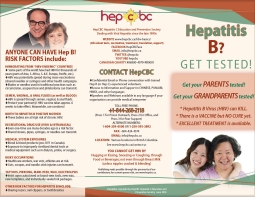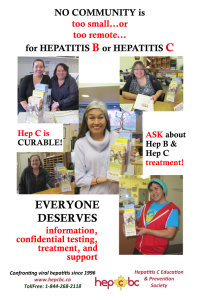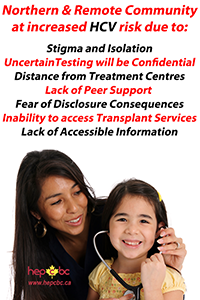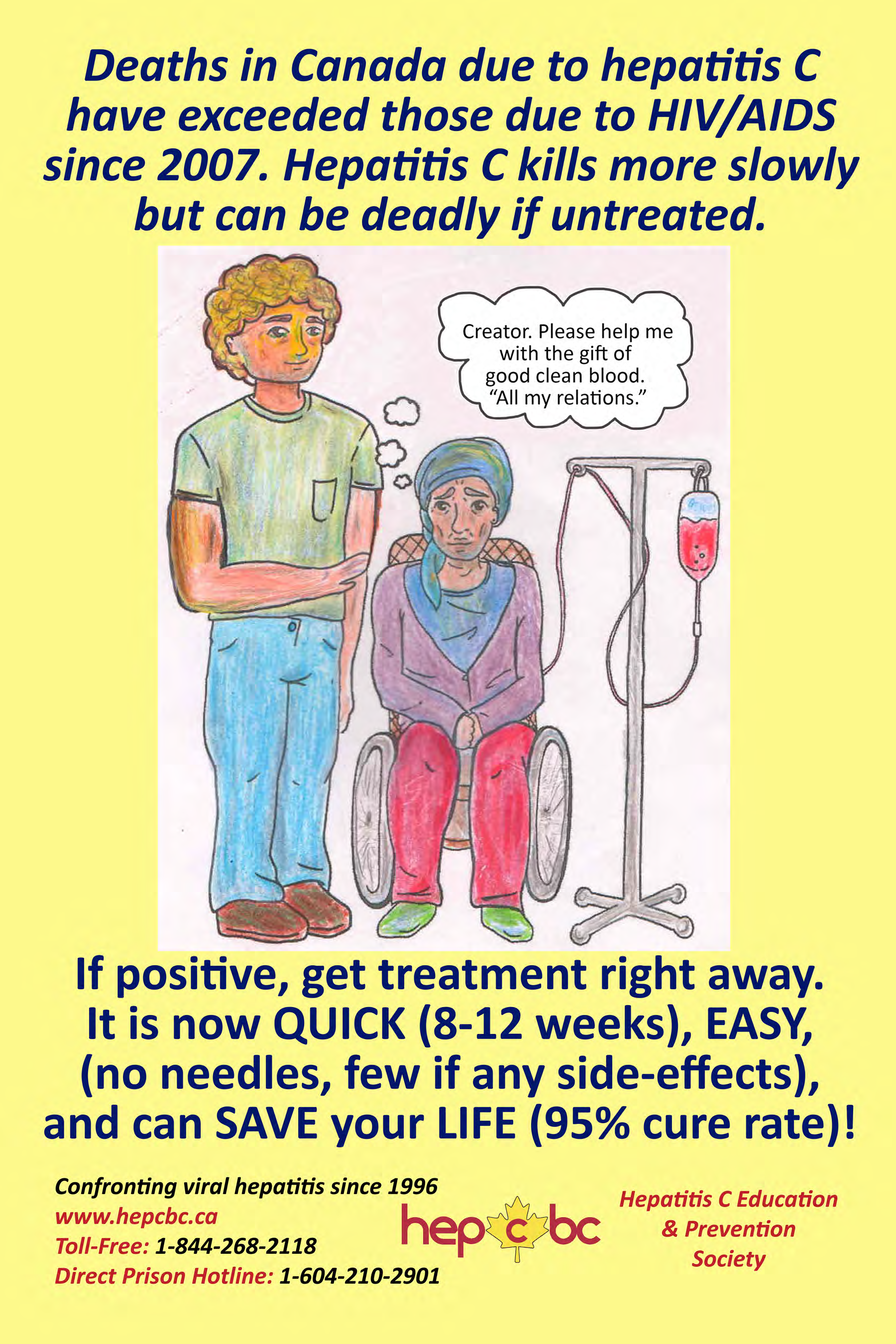This page is an archive. Its content may no longer be accurate and was last updated on the original publication date. It is intended for reference and as a historical record only. For hep C questions, call Help4Hep BC at 1-888-411-7578.
Eliminating Viral Hepatitis in Aboriginal Communities of BC
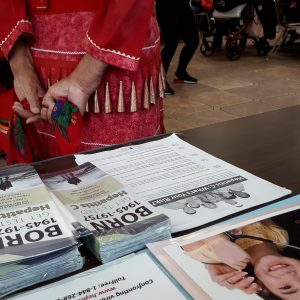
British Columbia’s Aboriginal communities (both rural and urban) are at particular risk of viral hepatitis (B and C) for a variety of reasons, including a common practice of shared vaccination needles a few decades back, frequent “top-up” transfusions following childbirth, various Residential school practices, endemic hepatitis B in the far north, distrust of confidentiality in small local health units, and unnecessary shame which can lead people to avoid testing and treatment, or even discussing viral hepatitis at all.
Rural and Urban Aboriginal communities have different needs and lifestyles; however, the viral hepatitis knowledge the two communities need overlaps in many ways. This page is dedicated to helping speed up the elimination of viral hepatitis in Aboriginal Communities worldwide, starting in British Columbia! SEE BELOW FOR:
- Free brochures (8″ X 11″) and posters (11″ X 18″) – downloadable or request hard copies by mail
- Message written by and for Aboriginal people by Canadian Aboriginal AIDS Network (CAAN)
- Links to Photos and other Information about HepCBC’s Outreach Roadshows which have visited numerous Aboriginal communities throughout the province over several years
- Other Great Links about Eliminating Viral Hepatitis in Aboriginal Communities!
- Invitation to share or participate in viral hepatitis outreach activities in your community
First, HepCBC invites you to download or request hard copies (free) of our posters and brochure created under the advice of medical professionals, HCV+ people, and affected family members from Aboriginal communities in both rural and urban British Columbia. Your feedback is always welcome. Please help us to distribute and to continue improving our publications.
=====================================================================
BROCHURES:
=====================================================================
POSTERS:

DONT ASK ME poster – simple version: ‘Don’t Ask Me How I Caught It – Ask Me How I’m Doing’. Original photography donated by Ramana Waldhaus, of Haida Gwaii.
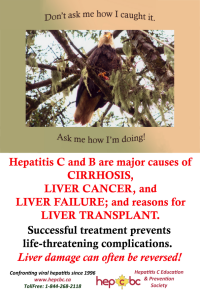 |
DONT ASK ME poster- more info version: about the types of liver damage HCV can cause: Cirrhosis, Liver Cancer, Liver Transplant, and Liver Failure. Following successful treatment, life-threatening complications may be prevented. Liver damage can be reversed if stopped in time! Original photography donated by Ramana Waldhaus, of Haida Gwaii.
MEDICINE WHEEL poster about HCV: “The needs of someone living with hepatitis C are like the needs of the rest of the community” – Poster, wheel text and design concept and permission to re-distribute them thanks to Terry Optekamp, Community Health Representative from Chippewas of Nawash Health Centre.
NO COMMUNITY IS TOO SMALL OR TOO REMOTE FOR HCV poster: “Everyone deserves HCV information, confidential testing, treatment, and support.” Photos taken on HCV outreach trip to northwestern BC in 2013 by Cheryl Reitz of HepCBC. “Thanks to all the wonderful smiling new friends!”
NORTHERN & REMOTE COMMUNITY AT INCREASED HCV RISK poster: “Due to Stigma & Isolation, Uncertain Testing will be Confidential, Distance from Treatment Centres, Lack of Peer Support, Fear of Disclosure Consequences, Inability to access Transplant Services, and Lack of Accessible Information.” Photo purchased from Stock Photo service, “Shutterstock #84158728”.
WHY TO GET TREATED FOR HEPATITIS C poster: “Deaths in Canada due to hepatitis C have exceeded those due to HIV/AIDS since 2007. Hepatitis C kills more slowly but can be deadly if untreated. If positive, get treatment right away. It is now QUICK (8 – 12 weeks), EASY (no needles, few if any side-effects), and can SAVE your LIFE (95% cure rate)!” Plate 11 from “Hepatitis C and Hepatitis B Can be Eliminated” Colouring Book, coloured by an inmate at William Head institution, Metchosin, BC.
|
===================================================================== CAAN MESSAGE:Text below was written for Aboriginal people, by Aboriginal people, provided by Canadian Aboriginal AIDS Network: | |
|
===================================================================== CAAN MESSAGE:Text below was written for Aboriginal people, by Aboriginal people, provided by Canadian Aboriginal AIDS Network: |

Hepatitis C is a major concern amongst Aboriginal people in Canada. Poor health, poverty, low education, limited housing, high unemployment, and sanitation problems are important factors that promote the spread of hepatitis C infections among Aboriginal people. Factors that increase the risk of hepatitis C infections include the regular use of injection drugs and involvement in other high-risk activities at an early age. Aboriginal prisoners in Canada’s jails may be at greater risk due to the high rates of infection among this population.
As well, researchers have identified the previous widespread use of non-disposable medical equipment as a potential cause for hepatitis C infections among Inuit. Researchers believe that infection rates for hepatitis C are higher among Inuit and First Nations (1% to 18%) compared to other the Canadians (0.5% to 2%). Research also suggests that the pattern of infections and the various factors that place Aboriginal people at risk are different from other Canadians and therefore hepatitis C prevention education and health promotion should be different as well. Many resources are available online including brochures, posters, and A Guide for Getting Ready for Treatment. Please click on the links to obtain further information.
National Aboriginal Hepatitis C Awareness Month is held annually from May 1 to May 31.
Source: http:/www.caan.ca/national-aboriginal-hepatitis-c-awareness-campaign/
=================================================
HepCBC ROADSHOWS (PHOTOS & DESCRIPTIONS):
2013: First Greyhound Roadshow through Interior and NW BC (solitary bus trip by HepCBC volunteer C. Reitz)
Part 1: (Feb. 11 – 19, to Smithers, Moricetown, and Terrace) at: http://hepcbc.bchep.org/wp-content/uploads/2016/03/hepc-bull_2013-03-01.pdf, page 5
Part 2: (Feb. 19 – , Prince George, Williams Lake, Kamloops, Vernon, Kelowna, and Merritt) at: http://hepcbc.bchep.org/wp-content/uploads/2016/03/hepc-bull_2013-04-01.pdf, pages 1 and 5.
Note: Page 5 explains how connections were made for further Hepatitis Outreach Roadshows: “…I learned that the many small communities between Quesnel and Williams Lake, and between Williams Lake and Bella Coola are in particular need of HCV awareness and support…”
2014: (May – 5600 km in 18 days!) HepCBC Northern Outreach Roadshow 2014 (roadtrip by 3 HepCBC volunteers F. Falconer (RN), R. Plummer (RN) and C. Reitz
Click here to see an annotated slideshow of the HepCBC team’s hepatitis C outreach trip to north central and NW BC in May, 2014
(the slideshow was published on You Tube in 2016). https://www.youtube.com/watch?v=0Be_ftY8di0
2017: March 5/6 in Prince George: HepCBC had an info booth at Wellness North EXPO in Prince George, then presented results of BC Centre for Disease Control research into rural/northern disparities in HCV treatment which we had requested. Presentation was in a webinar at Positive Living North (trip by 2 HepCBC volunteers L. Gloslee and C. Reitz):
http://hepcbc.bchep.org/2017/03/10/week-review-march-3-2017-march-10-2017/ (Scroll down to March 5 and March 6) Also see more about March 6th event at:
http://hepcbc.bchep.org/2017/03/08/march-6th-bccdc-presentation-prince-george-bc/.
2017: March 14 – 23 in Interior and Kootenays: (bus and road trip by 3 HepCBC volunteers R. Plummer (RN), C. Reitz, and R. Tomlin – 1 nurse, 2 patient-advocates)
Part 1 (Lytton, Spences Bridge, Cache Creek – March 14 – 16, a solitary Greyhound bus journey by C. Reitz) Article and 16 photos at
http://hepcbc.bchep.org/2017/03/17/uralremoteindigenous-hepatitis-c-outreach-2017-part-1/
Part 2 (Castlegar – March 20 workshop for Selkirk College student nurses and community members by R. Plummer, R. Tomlin, and C. Reitz) Article and 6 photos at
http://hepcbc.bchep.org/2017/03/24/selkirk-college-student-nurses-bring-hepcbc-ankors-hepatitis-c-info-event/
Part 3 (Kamloops and Kelowna – March 17-19 and Castlegar, Trail, Balfour/Ainsworth Hot Springs area, Kaslo, Nelson, Salmo, and Ymir March 21 – 23)
http://hepcbc.bchep.org/2017/04/21/hepatitis-c-greyhound-roadshow-interior-bc-part-3-3-march-17-25/
2017: (September) HepCBC Outreach Trip to NW BC (Telegraph Creek and Dease Lake) by volunteer R. Plummer (RN). She had worked for many years from mid-1970s through late 1980s, doing outreach nursing in northern communities, often flying in, while raising her family in Telegraph Creek, which is near Dease Lake. She often returns to visit and reconnect with old friends, but this time decided to seize the opportunity to talk to them about her new passion, viral hepatitis. Lots of pamphlets were left behind, and knowledge exchanged about the two communities’ viral hepatitis needs.
Click here to see an annotated slideshow of the trip to Telegraph Creek and Dease Lake:
http://hepcbc.bchep.org/2019/11/12/outreach-visit-to-nw-bc-2017-sept/
2018: March 12 – 21 in Northern Vancouver Island VIRAL HEPATITIS Outreach Roadshow Trip 2018 (Roadtrip by 3 HepCBC volunteers R. Plummer (RN), L. Anderson, and C. Reitz – 1 nurse, 2 patient-advocates)
Itinerary & Map: http://hepcbc.bchep.org/2018/03/08/northern-vancouver-island-viral-hepatitis-outreach-roadshow-trip-2018/
Click on the images in the 9 different slideshows below to open the slideshow in a lightbox (bigger view, and full view of vertical shots)
Photos, Part 1 (6 slideshows): http://hepcbc.bchep.org/2018/03/22/northern-vancouver-island-viral-hepatitis-outreach-roadshow-trip-2018-slideshow/
Photos, Part 2 (3 slideshows): http://hepcbc.bchep.org/2018/08/21/northern-vancouver-island-viral-hepatitis-outreach-roadshow-trip-2018-slideshow-part-2/
2018: April 12 at Snaw-Naw-As Health Fair (Nanoose Bay/Lantzville, BC) with 2 HepCBC volunteers, L. Anderson, and C. Reitz (patient-advocates)
Photos: http://hepcbc.bchep.org/2018/06/29/hepcbc-at-snaw-naw-as-health-fair-april-2018/
=====================================================================
OTHER GREAT LINKS:
Be Sure to Check These Out! Click on the photo to link.
Pauktuutit Women of Canada brings hepatitis C education and support to Aboriginal women, and works with CAAN and other organizations to commemorate May, National Aboriginal Hepatitis Month. See their great resources at https://www.pauktuutit.ca/health/national-aboriginal-hepatitis-c-awareness-month/

VIEW OR DOWNLOAD HepCBC’s ADULT COLOURING BOOK FOR Hepatitis B and C (originally developed for a prison-based population) HERE:
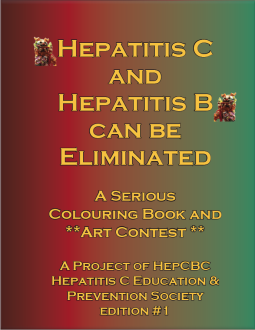
=====================================================================
INVITATION TO SHARE & PARTICIPATE:
This is exciting! If eliminating viral hepatitis in your community sounds like something you are interested in, please let us know your ideas, and we’ll see if we can work together to make them work! See our “Contact Us” page for phone and contact form information. We are all volunteers here now, so if someone does not answer right away, please be patient and someone will get back to you soon. We are really happy to talk to someone new!
If you are interested in becoming a HepCBC volunteer, here is our online application form: http://hepcbc.bchep.org/about-hepcbc/volunteer/hepcbc-volunteer-application-form/
For more information about volunteering at HepCBC, see http://hepcbc.bchep.org/about-hepcbc/volunteer/


